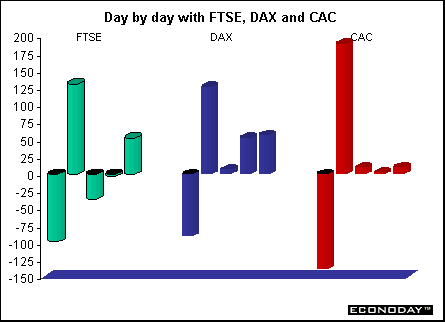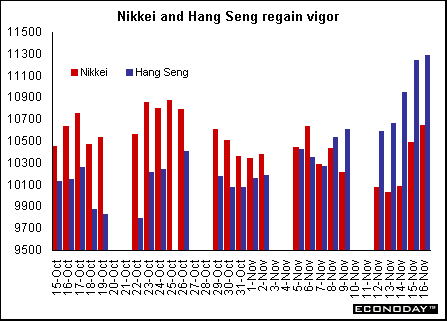
Britain and Europe
The growing realization that Monday's air crash in New York was unlikely to have been the result of terrorist activity plus news of increasing success by anti-Taliban forces in Afghanistan inspired strong rallies in London, Paris and Frankfurt equity markets on Tuesday. The FTSE regained the 5,200 level which market bulls saw as a big plus. The winners in the indexes followed here were heavily loaded with TMT stocks. Later in the week investors decided to take profits and gains petered out as the weekend approached.

Last week saw an avalanche of key British economic data, which showed inflation under control, the consumer showing some weakness at last, and the labor market showing the first signs of easing. Still, the British economy remains the strongest in the Group of Seven.
Asia
All Asian markets tracked here benefited from growing hope that the economic turnaround is on the horizon. Technology stocks, which rely heavily on exports, continued their rise in response to improved recovery prospects in U.S. consumer spending and a weaker yen. The Hong Kong Hang Seng closed at its highest level since August 30. Again hopes for a faster global recovery spurred investors on. The reason for these hopes was found in the U.S. October retail sales report, which rebounded from September's abysmal showing. Cheaper crude oil is a definite plus for Japan which imports virtually all of its supplies.

The Bank of Japan left monetary policy unchanged as it continues to wait for Prime Minister Junichiro Koizumi to hammer out details of his plan to force banks to write off bad loans. The central bank is running out of options to pull Japan out of a recession that many say will run two years. The bank has already pared interest rates to near zero and pumped trillions of yen into the money market. But the money isn't getting to borrowers because banks, weighed down by an estimated 151 trillion yen ($1.2 trillion) of bad and risky loans, are reluctant to extend new credit. Koizumi has offered few details of his plan to get the biggest banks to write off their worst loans and Hayami is reluctant to do more until the government's plans are clearer.


Introduction • Global Stock Market Indexes • Recap of Global Markets • Currencies • Indicator Scoreboard

The Bottom Line • Looking Ahead
|